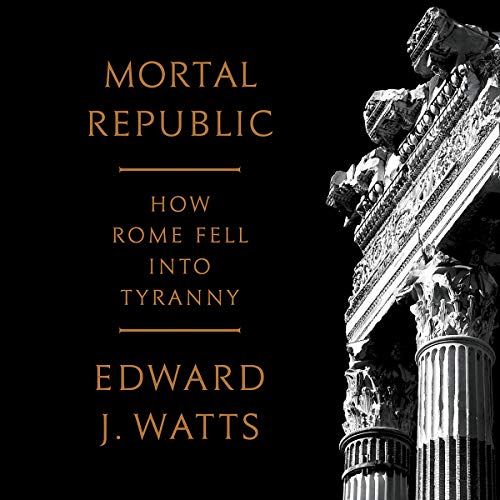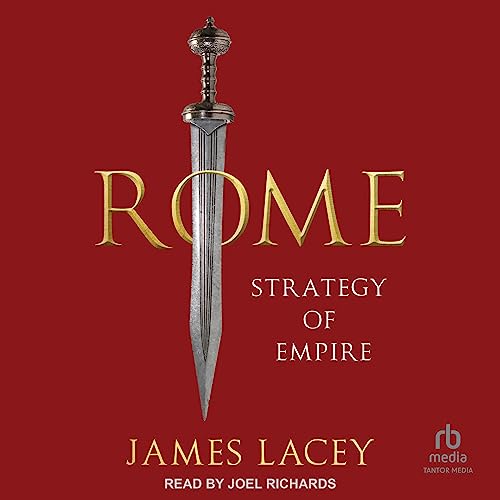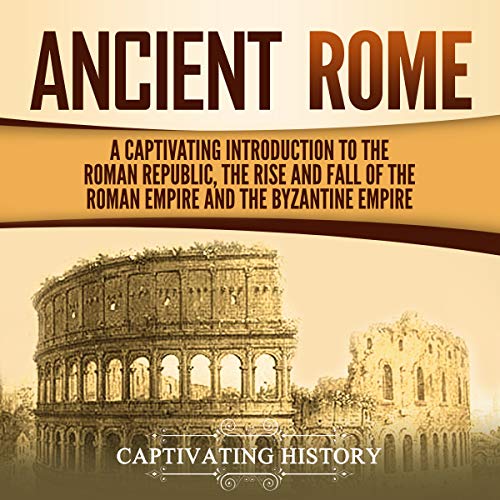 Enjoy this audiobook free + more
Enjoy this audiobook free + more
Free title with your free trial!
$0.00$0.00
- Click above to get a preview of our newest plan - unlimited listening to select audiobooks, Audible Originals, and podcasts.
- You will get an email reminder before your trial ends.
- $7.95$7.95 a month after 30 days. Cancel online anytime.
Buy
-13% $15.04$15.04
 Preview
Preview The Eternal Decline and Fall of Rome: The History of a Dangerous Idea
 Audible Audiobook
– Unabridged
Audible Audiobook
– Unabridged
As this book intriguingly explores, for those who would make Rome great again and their victims, ideas of Roman decline and renewal have had a long and violent history.
The decline of Rome has been a constant source of discussion for more than 2200 years. Everyone from American journalists in the 21st century AD to Roman politicians at the turn of the third century BC have used it as a tool to illustrate the negative consequences of changes in their world. Roman prophets of decline were, ultimately, proven correct - a fact that makes their modern invocations all the more powerful.
The Eternal Decline and Fall of Rome tells the stories of the people who built their political and literary careers around promises of Roman renewal as well as those of the victims they blamed for causing Rome's decline. The story begins during the Roman Republic just after 200 BC. It proceeds through the empire of Augustus and his successors, traces the Roman loss of much of western Europe in the fifth century AD, and follows Roman history until its fall in 1453. If Rome illustrates the profound danger of the rhetoric of decline, it also demonstrates the rehabilitative potential of a rhetoric that focuses on collaborative restoration, a lesson of great relevance to our world today.
- Listening Length11 hours and 16 minutes
- Audible release dateMarch 1, 2022
- LanguageEnglish
- ASINB09SGV47X3
- VersionUnabridged
- Program TypeAudiobook
People who viewed this also viewed
- Audible Audiobook
- Audible Audiobook
- Audible Audiobook
- Audible Audiobook
- Audible Audiobook
People who bought this also bought
- Audible Audiobook
- Audible Audiobook
- Audible Audiobook
- Audible Audiobook
- Audible Audiobook
Related to this topic
- Audible Audiobook
- Audible Audiobook
- Ancient Rome: A Captivating Introduction to the Roman Republic, the Rise and Fall of the Roman Empire, and the Byzantine Empire
 Audible Audiobook
Audible Audiobook - Audible Audiobook
- Audible Audiobook
Product details
| Listening Length | 11 hours and 16 minutes |
|---|---|
| Author | Edward J. Watts |
| Narrator | David Colacci |
| Audible.com Release Date | March 01, 2022 |
| Publisher | Tantor Audio |
| Program Type | Audiobook |
| Version | Unabridged |
| Language | English |
| ASIN | B09SGV47X3 |
| Best Sellers Rank | #297,127 in Audible Books & Originals (See Top 100 in Audible Books & Originals) #341 in Ancient & Classical Roman History #358 in Medieval European History #369 in History of Civilization |
Customer reviews
Customer Reviews, including Product Star Ratings help customers to learn more about the product and decide whether it is the right product for them.
To calculate the overall star rating and percentage breakdown by star, we don’t use a simple average. Instead, our system considers things like how recent a review is and if the reviewer bought the item on Amazon. It also analyzed reviews to verify trustworthiness.
Learn more how customers reviews work on AmazonCustomers say
Customers find the book insightful and well-researched. They describe it as an interesting read for historians, though some feel the history is superficially presented.
AI-generated from the text of customer reviews
Customers find the book well-researched and insightful. They describe it as a good read for historians. However, some readers feel the discussion is repetitive.
"Good read for perhaps historians. A bit droll but, it identifies the Roman empire great and foolish throughout its history. The point of the book." Read more
"A brilliant discussion. Rome and the USA both had leaders who lied and promised miracles. And the ordinary man believed them!" Read more
"...on the strength of the author's The Last Pagan Generation, which was insightful and interesting...." Read more
"Edward Watts’ work is well-researched and highlights the major characters in the long history of Rome...." Read more
Customers have different views on the history of the Roman Empire. Some find it comprehensive and well-researched, highlighting major characters. Others feel it provides a superficial treatment of the long history of Rome.
"Good read for perhaps historians. A bit droll but, it identifies the Roman empire great and foolish throughout its history. The point of the book." Read more
"...skimmed over or omitted, and so generally this is just an extremely short history of Rome that includes the Byzantine period and has a few pages of..." Read more
"Edward Watts’ work is well-researched and highlights the major characters in the long history of Rome...." Read more
Top reviews from the United States
There was a problem filtering reviews right now. Please try again later.
- Reviewed in the United States on September 26, 2021Good read for perhaps historians. A bit droll but, it identifies the Roman empire great and foolish throughout its history. The point of the book.
- Reviewed in the United States on September 22, 2021A brilliant discussion. Rome and the USA both had leaders who lied and promised miracles. And the ordinary man believed them!
- Reviewed in the United States on January 8, 2025I bought this book as a gift, so I've not read it myself.
- Reviewed in the United States on November 20, 2022I bought this book on the strength of the author's The Last Pagan Generation, which was insightful and interesting. This book, by contrast, was essentially a very cursory overview of Roman history with an ostensible political point shoehorned in to make it seem topical. First, the author was extremely one-sided in his treatment of how "decline and renewal" stories are used (though this was only developed in the last 8 pages of the book), when politicians of many different political persuasions have employed the theme. More importantly, however, he failed to demonstrate why there is anything unique about narratives of specifically *Roman* decline and renewal. Although famous and popular due to Gibbon and others, the concept of decline as an ideological position is worthy of more in-depth treatment, drawing on writers like Oswald Spengler or Jacques Barzun.
This book does not provide that. It instead tells a highly abbreviated version of Roman history with a minor emphasis on narratives of decline and/or renewal. Anyone who has read Gibbon, or even just a breezy history of Rome before, will find almost nothing new. Many nuances are missing, facts that might contradict the narrative are skimmed over or omitted, and so generally this is just an extremely short history of Rome that includes the Byzantine period and has a few pages of throwaway information about a very select few authors who were interested in the decline and fall of Rome, followed by an extremely short political point at the end.
If you don't have time to read a major history of Rome and want to read something short and "big picture", this book isn't terrible. If you want something with more depth, read Gibbon (well worth the time and don't skip the footnotes whatever you do!). Read Judith Herrin's The Formation of Christendom if you want to read about post-Fall of the Western Empire Rome. Read The Fate of Rome by Kyle Harper for a great analysis of the empire's weaknesses. Read Luttwak's analyses of Western and Byzantine military strategy. Read Mommsen. Or go to the sources and read Livy, Tacitus, Ammianus Marcellinus and others.
- Reviewed in the United States on May 27, 2023Edward Watts’ work is well-researched and highlights the major characters in the long history of Rome. More importantly, it traces a central theme - the rise and fall of the empire - as it played out over the millennia.
- Reviewed in the United States on December 12, 2021You really have to be deeply interested in the intricacies of Roman leadership to stay with this study as the detailed violence becomes overwhelming and the names lose their identity. It's not a book intended for casual readership.
- Reviewed in the United States on April 17, 2024Great idea but I lost the author somewhere in the 8th century. I would have preferred to keep the analysis to the Republic and post Republic period.
- Reviewed in the United States on January 23, 2024In the Acknowledgments section of this book, Watts explains that it was originally conceived of as an essay. It should have remained one, because over the course of the next 242 pages - the bulk of which is a rather dull catalogue of Roman emperors whose names you cannot retain (unless you already know them), and whose assassinations are mostly unremarkable (except for the Et tu Brute? one, which Watts does not mention), and whose accomplishments are all exactly the same (they built some big stuff, codified some laws, won some wars) - you will be bored to tears. The problem Watts faces in this tome is that when one bases a book on a thesis, one has to actually prove the thesis, which Watts doesn't do.
The thesis of this overblown essay is this: The decline and fall of Rome is a dangerous idea because it draws on the past to destabilize the present. It's a good thesis, but Watts didn't need to go through 2000 years of Roman history to prove it, because the idea was, in fact, largely irrelevant to Rome itself.
The idea that Rome was falling into decline because of "decadence and sin" was used as a rhetorical strategy by various Roman emperors to seek support for their rule, during which they promised Rome would be be restored to its former greatness. (If Romans had worn red caps, they would have been emblazoned with MRGA.) However, the decline and renewal rhetoric wasn't actually dangerous during the 2000 years of Roman rule.
At what point did this idea become dangerous? Clearly not in ancient times. It became dangerous in modern times, when notions about the decline of a glorious imperial past have been used to "destabilize the present." That is indeed a worthy thesis on which to base an essay. But - and I can't state this enough - it needs to be PROVEN.
A few quotes by Phyllis Schlafly about the fall of Rome (however entertainingly ridiculous they may be), or a speech by Ronald Reagan claiming that Rome fell because of welfare queens, or even Trump's "American carnage" speech do not in themselves prove the point. Not even Mussolini's attempt at restoring the glory of Rome through fascism proves the point. What might have proven the point would have been a cogent analysis of why the mythology surrounding the Roman Empire's fall still resonates with people today and exactly how that myth is currently used to disrupt present day political institutions and societies.
But in order to do that, Watts would have needed a vision that encompassed more of modern history than he was willing to take on. The enduring power of the "decline and fall" myth is undeniable, I just wish this analysis had fallen into the hands of someone more capable of fully exploring it.
My recommendation to readers who do not want to be bored to death is to read the Introduction and the final two chapters. Skip the middle.
Top reviews from other countries
 Malcolm RedfellowReviewed in the United Kingdom on January 5, 2022
Malcolm RedfellowReviewed in the United Kingdom on January 5, 20225.0 out of 5 stars An inspiring, and acerbic approach
This is not a history of Rome (though it includes many insights). It is a history, told through the literature of the culture, of Romanitas — the idea of what Rome and Romans thought themselves to be, or what they ought to be.
Watts applies that to our later civilisation, and its insecurities.
-
 Johannes MarianReviewed in Germany on November 13, 2021
Johannes MarianReviewed in Germany on November 13, 20213.0 out of 5 stars Eine amerikanische Blase
Das Buch ist grundsätzlich lesenswert und enthält viele richtige Beobachtungen. Es hat aber einen offensichtlichen Mangel, der sich leider an immer mehr amerikanischen und britischen Publikationen beobachten lässt: Watts nimmt fast (!) ausschließlich englischsprachige Literatur zur Kenntnis. Das ist natürlich in vielen Wissenschaften längst die Regel; in den Altertumswissenschaften gilt aber, dass man einschlägige Arbeiten in den vier modernen Sprachen des Faches (Englisch, Französisch, Deutsch und Italienisch) zur Kenntnis nehmen muss, wenn man seriös mitreden will, denn anders als in vielen anderen Disziplinen werden wichtige und zentrale Arbeiten bis heute in all diesen Sprachen publiziert. Die besten amerikanischen Historiker zur Spätantike (Peter Brown, Michael Kulikowski, Noel Lenski, Geoffrey Greatrex etc.) rezipieren daher selbstverständlich auch aktuelle Arbeiten, die auf Deutsch oder Französisch verfasst werden. Watts, eigentlich ein guter Historiker, hat es sich hier hingegen zu leicht gemacht; was umso bedauerlicher ist, als das Narrativ vom "Untergang des Römischen Reiches" natürlich in ganz Europa bis heute sehr wirkmächtig ist. Das deutlichste Beispiel für dieses Manko ist sicher, dass Watts das grundlegende Werk "Der Fall Roms" von Demandt ebensowenig zu kennen scheint wie Lancons "La chute de l'empire romain". Dadurch wird sein Blick sehr eingeschränkt. In einem Wort: Wenn ein Buch drei Viertel der relevanten Forschungsliteratur nicht verarbeitet, dann ist das ein ziemliches Manko.




















